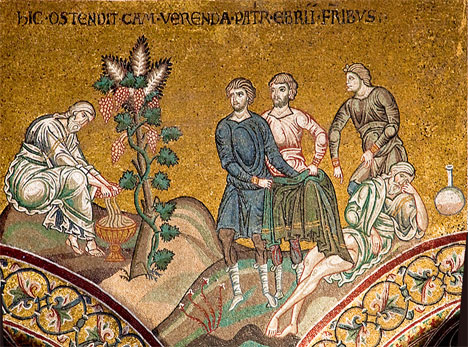Apr
17
2014
 Letters to My Sons: A Humane Vision for Human Relationships, by Matt Bianco
Letters to My Sons: A Humane Vision for Human Relationships, by Matt Bianco
An excerpt from Letter XII: “Hatred Leads to Blindness.”
Today I was thinking again about Tolkien’s Fellowship of the Ring. Do you remember the scene where the fellowship enters the land of Lothlórien? Gimli is the only dwarf in the fellowship and he is singled out by the elves. Their hatred for the dwarves causes them to see him as an enemy when his labors are with them as a friend.
Continue reading
Comments Off | tags: Genesis, Matt Bianco, Parenting | posted in Biblical Theology, Christian Life
Mar
17
2014

“Modern commentators seem to overlook the promise of children in Genesis 1, and how these unmentioned ‘innocents,’ yet in Adam’s loins, are silent but crucial characters in Genesis 3.”
When Paul refers to Abraham as the father of all who believe, the one through whom all nations would be blessed (Romans 4:9-22), we must be prepared to interpret his inspired words through the lens of the House of God, the ever-present architecture of Eden.
The Name of the Father
God’s household in heaven was a tent of servants—the angels—but there was only one Son, through whom came all Creation. This means that the first verses of John’s Gospel, which describe the pre-incarnate Word, can tell us a great deal about God’s intentions for Adam, the incarnate image of God. All that Jesus was in heaven, Adam was to be on earth:
This post has been slain and resurrected for inclusion in my 2015 book of essays, Inquietude.
Continue reading
Comments Off | tags: Abraham, Covenant Theology, Feasts, Genesis, Literary Structure, Tabernacle | posted in Bible Matrix, Biblical Theology
Mar
10
2014

For as in those days before the flood they were eating and drinking, marrying and giving in marriage, until the day when Noah entered the ark, and they were unaware until the flood came and swept them all away, so will be the coming of the Son of Man. (Matthew 24:38-39)
Most disputes concerning the meaning of the Scriptures are not due to a lack of trying when it comes to hermeneutics. They result from a lack of due process. By this, I do not mean the process of interpretation but the identification in the Scriptures of the processes of God.
An example would be the meaning of Christ’s words concerning the unpardonable sin, which have terrified many Christians unnecessarily. Blasphemy against the Spirit is unpardonable not because it is the worst sin. It is unpardonable because it is the last sin.
This post has been slain and resurrected for inclusion in my 2015 book of essays, Inquietude.
Continue reading
2 comments | tags: AD70, Babylon, Covenant Theology, Genesis, Hebrews, Herod, Matthew, Matthew 24, Nebuchadnezzar, Noah, Numbers | posted in Bible Matrix, Biblical Theology, Christian Life, The Last Days
Feb
3
2014

Paul understood God’s ways. God’s ways are “Covenant-shaped,” they concern transformation, and the glory always comes at the end. It is the result of God’s Word going out and coming back with something good, His own goodness multiplied.
Continue reading
4 comments | tags: Circumcision, Covenant Theology, Genesis, Literary Structure, Paul, Romans | posted in Bible Matrix, Biblical Theology
Jan
16
2014
or Baptism into Baal

Then you shall say to Pharaoh,
‘Thus says the Lord,
Israel is my firstborn son,
and I say to you,
“Let my son go that he may serve me.”
If you refuse to let him go,
behold,
I will kill your firstborn son.’”
(Exodus 4:22)
My Federal Vision friends believe baptism is an important subject, from both theological and pastoral points of view. I agree, but for me it is also an issue of aesthetics. The Bible has a wonderfully consistent internal logic, and paedobaptism crunches the gears at every turn.
Peter Leithart just posted something concerning baptism, and it’s worth answering, not only “because somebody on the internet is wrong,” but also because it is an issue I’ve just finished dealing with in The Shape of Galatians. It should be noted that Trinity House is hosting some lectures on sacraments by a baptist, so Dr Leithart and his colleagues have a spirit that should be imitated by theologians everywhere. My own posts here are always bait in the hope of a bite, a friendly disputatio, so don’t take them the wrong way. If a friend has soup on his tie, or wax in his ear, or a fertility rite in his sacrament, what sort of friend isn’t going to point it out!?
Continue reading
4 comments | tags: Abel, Abraham, Baptism, Cain, Federal Vision, Galatians, Genesis, Numbers, Paul, Peter Leithart, Romans, The Shape of Galatians | posted in Bible Matrix, Biblical Theology, Quotes
Dec
20
2013

God loves His architecture. The first chapter of the Bible is architecture. The books of Moses and the book of Revelation are filled with architecture, and the same floorplan underlies every book in between. Most Christians don’t understand the Bible’s architecture and modern Christians not only do not understand it, they do not care for it. But God loves His architecture. To love the Bible one must love its architecture. To understand the Bible, one must let the architecture inform one’s understanding.
Continue reading
Comments Off | tags: Abel, Baptism, Cain, Circumcision, Covenant curse, Covenant Theology, Genesis, High Priest, Numbers, Peter Leithart | posted in Biblical Theology, Quotes
Nov
21
2013

“Things ain’t cookin’ in my kitchen
Strange affliction wash over me
Julius Caesar and the Roman Empire
Couldn’t conquer the blue sky…” [1]
Today, the Australian government’s carbon tax repeal bills cleared Parliament’s lower house. They will be voted upon in the Senate next year. To see this reported as an act of climate vandalism by the media isn’t a surprise. What is surprising is the consternation of many Christians.
Continue reading
5 comments | tags: Covenant Theology, Culture, Economics, Flood, Gary North, Genesis, Postmillennialism, Tas Walker | posted in Biblical Theology, Christian Life, Creation, Ethics
Nov
5
2013

or Semina Divina
And Jesus, perceiving in himself that power had gone out from him, immediately turned about in the crowd and said, “Who touched my garments?” (Mark 5:30)
We aren’t told in Genesis 9 what Ham’s intention was when he “uncovered” his father, Noah. Peter Leithart and James Jordan both present some fascinating insights (which differ from each other), but perhaps there is a solution elsewhere in Genesis, which, combined with both these possibilities, offers something new.
This post has been slain and resurrected for inclusion in Praxeme: Journal of Systematic Typology.
Continue reading
Comments Off | tags: Abraham, Ark of the Covenant, Covenant curse, Covenant Theology, Genesis, James Jordan, Literary Structure, Moses, Noah, Peter Leithart | posted in Bible Matrix, Biblical Theology
Oct
28
2013
 Born from Above
Born from Above
I’m currently working hard on Bible Matrix III: The House of God. This third volume is bigger on the inside than it is on the outside. It really is. Being so engrossed in the shape and processes of the Bible (yes, even more than usual), it has struck me how foreign the various theological schools’ thinking and speech is to the actual text.
The debates about “Pauline Theology” are the perfect example, especially the focus on narrow (yet important) topics such as justification. An academic divides and redivides the text in the way an expert in any science overspecializes. He ends up knowing everything about nothing. After spending a few hours each day wandering and describing the halls of biblical architecture, I am more convinced than ever that the only way to fully understand Scripture is architecturally. This is because, for our glorious God, architecture is ethics, and ethics is architecture. Divorced from the biblical mud map, the Edenic grid, modern theologians are discussing less than a dim distorted reflection of the book God has given us. They are feeling their way around the house with their eyes shut. Continue reading
Comments Off | tags: Abraham, Baptism, Circumcision, Covenant Theology, Deuteronomy, Exodus, Feasts, Galatians, Genesis, Literary Structure, Moses | posted in Bible Matrix, Biblical Theology
Oct
9
2013

or Marriage is a Glory Box, a Hope Chest
In 1 Peter 3:7, the apostle writes:
Likewise, ye husbands, dwell with them according to knowledge, giving honour unto the wife, as unto the weaker vessel, and as being heirs together of the grace of life; that your prayers be not hindered.
The phrase “according to knowledge” (gnosis) is rendered “in an understanding way” in the NKJV and ESV. But is the exhortation for the husband to understand his wife, or to understand the source of his authority as her husband?
Continue reading
Comments Off | tags: AD70, Evolution, Genesis, Marriage, Totus Christus | posted in Bible Matrix, Biblical Theology, Creation, Q&A, The Last Days
 Letters to My Sons: A Humane Vision for Human Relationships, by Matt Bianco
Letters to My Sons: A Humane Vision for Human Relationships, by Matt Bianco

































